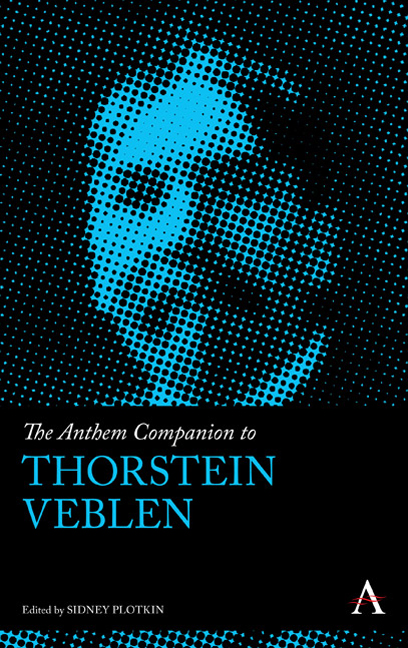Book contents
- Frontmatter
- Dedication
- Contents
- Acknowledgments
- Introduction: Thorstein Veblen's Elusive Project
- Part I METHOD, PHILOSOPHY AND VALUES
- Contents
- Part II CAPITALISM, SOCIAL STRUCTURE AND POLITICS
- Chapter Six Reigniting the Anthropology of Capitalism: Returning to Veblen, after Postmodernism, after Postcoloniality
- Chapter Seven On the Social Origin of the Leisure Class in Turkey: For a Veblenian Turn in the Marxian Research Program of Turkish Studies
- Chapter Eight Veblen's Localism and Its Ambiguities
- Chapter Nine Learning from Veblen's Masterless Man for Grassroots Democratic Change
- List of Contributors
- Index
Chapter Nine - Learning from Veblen's Masterless Man for Grassroots Democratic Change
from Part II - CAPITALISM, SOCIAL STRUCTURE AND POLITICS
Published online by Cambridge University Press: 10 January 2018
- Frontmatter
- Dedication
- Contents
- Acknowledgments
- Introduction: Thorstein Veblen's Elusive Project
- Part I METHOD, PHILOSOPHY AND VALUES
- Contents
- Part II CAPITALISM, SOCIAL STRUCTURE AND POLITICS
- Chapter Six Reigniting the Anthropology of Capitalism: Returning to Veblen, after Postmodernism, after Postcoloniality
- Chapter Seven On the Social Origin of the Leisure Class in Turkey: For a Veblenian Turn in the Marxian Research Program of Turkish Studies
- Chapter Eight Veblen's Localism and Its Ambiguities
- Chapter Nine Learning from Veblen's Masterless Man for Grassroots Democratic Change
- List of Contributors
- Index
Summary
Introduction
This chapter considers how Thorstein Veblen's concept of the ‘masterless man’ may offer guidance on the possibilities for grassroots democratic change in a predatory world. Before delving into Veblen and Occupy, let us take a historical glimpse into a popular insurgency from a long time ago: a spontaneous, anti- hierarchy occupation of public land in the province of Newfoundland, Canada (Rollmann, 2011).
In 1750, an Irish deserter named Peter Kerrivan led a group of soldiers, sailors and fishers who turned their back on what they felt were exploitative working conditions for which they received little compensation. They left their jobs and wandered off into the wild area of Butter Pot on the Avalon Peninsula, Newfoundland, where they established a camp, or in the terminology of the day, an ‘outlaw society’. Calling themselves the Society of Masterless Men, they formed their own free camps and survived by hunting, fishing and living off the land as well as by trading with local communities. As their numbers grew, so too did the alarm of the authorities. Local merchants and businesspeople complained that the Masterless Men were ignoring government authority and organizing a ‘riotous and unlawful assembly of people’. The authorities sent in the Royal Navy, but by then the band had grown quite large and knew the land well. Three separate military expeditions failed to capture them, and they were chased without success for decades. Over the next century, the Masterless Men roamed the hills of Butter Pot, eventually becoming absorbed into the local communities and outports.
These men were likely not altruistically motivated; they did not steal from the rich to give to the poor. They had no agenda, no list of demands, no exit strategy. Bandits and rebels they may have been, but it seems they only wanted to live independently, earning a living off the land. The band is also credited with having built the first roads in the region, both in order to move around the wilderness quickly as well as to serve as decoys to confuse the authorities. Their sense of self- reliance and willingness to challenge exploitation and the unduly harsh rule of government authority has left its imprint on Newfoundland's outport communities.
- Type
- Chapter
- Information
- The Anthem Companion to Thorstein Veblen , pp. 237 - 256Publisher: Anthem PressPrint publication year: 2017



